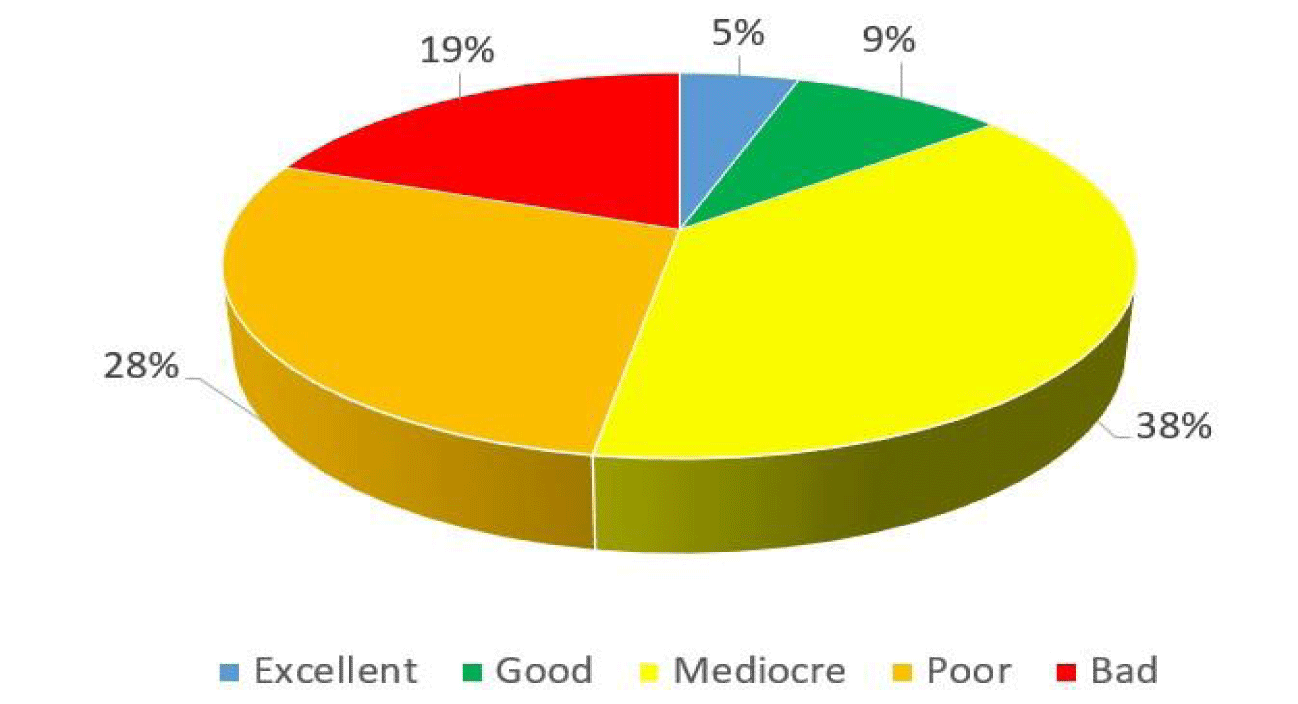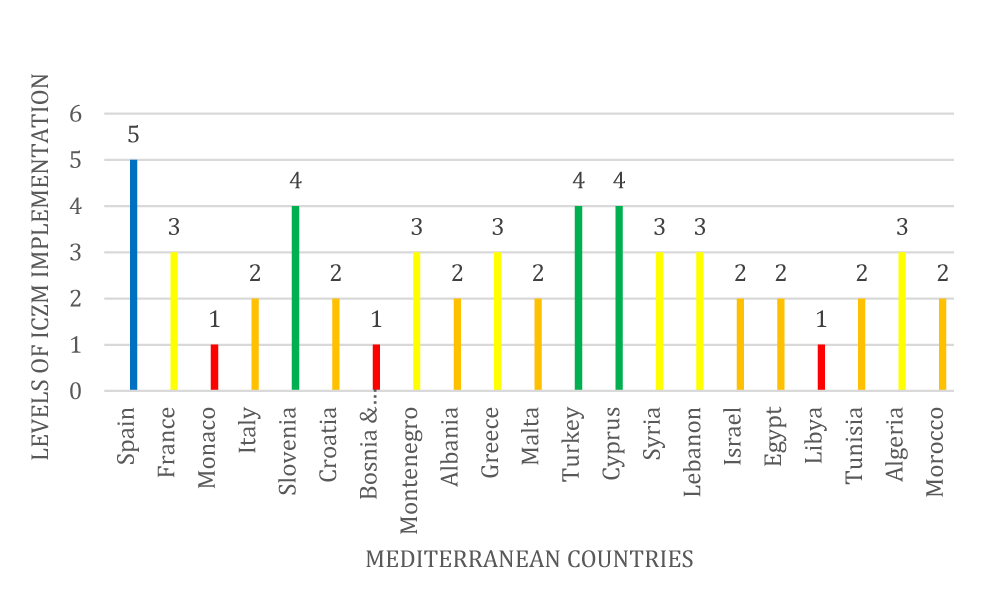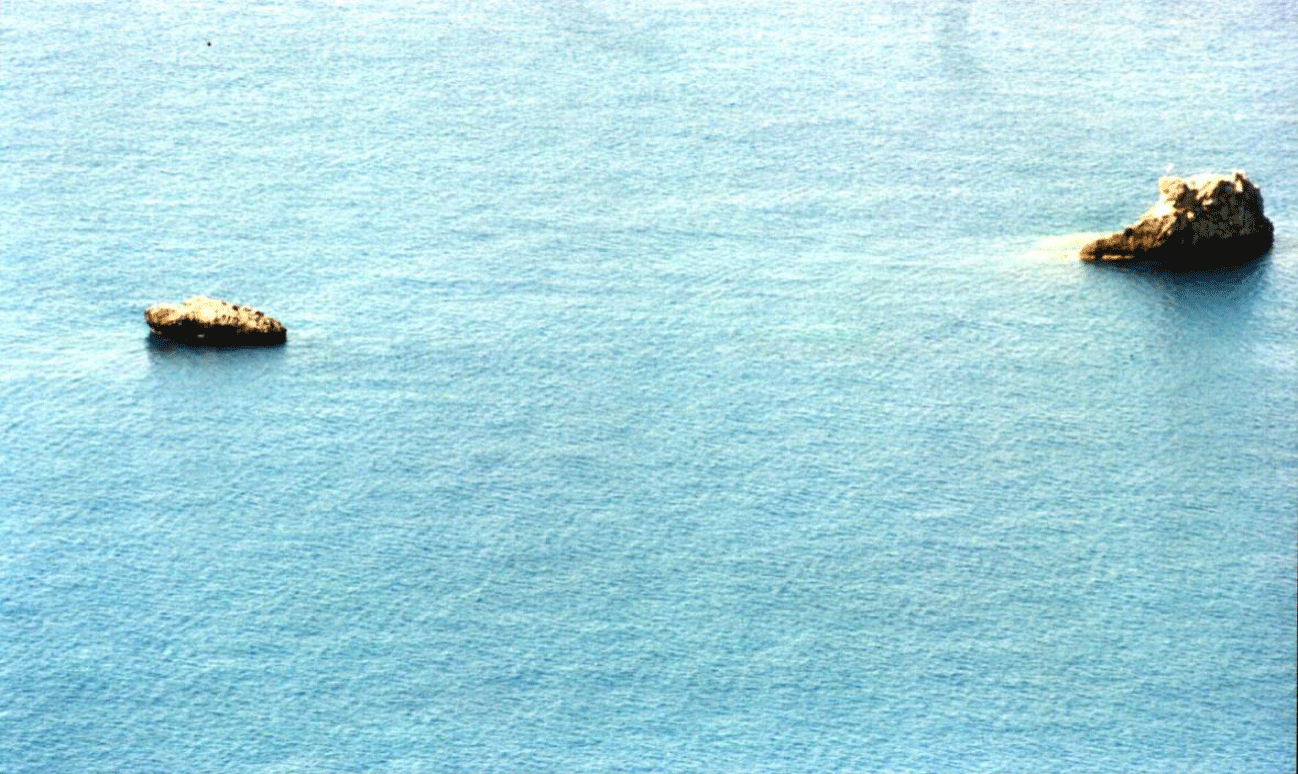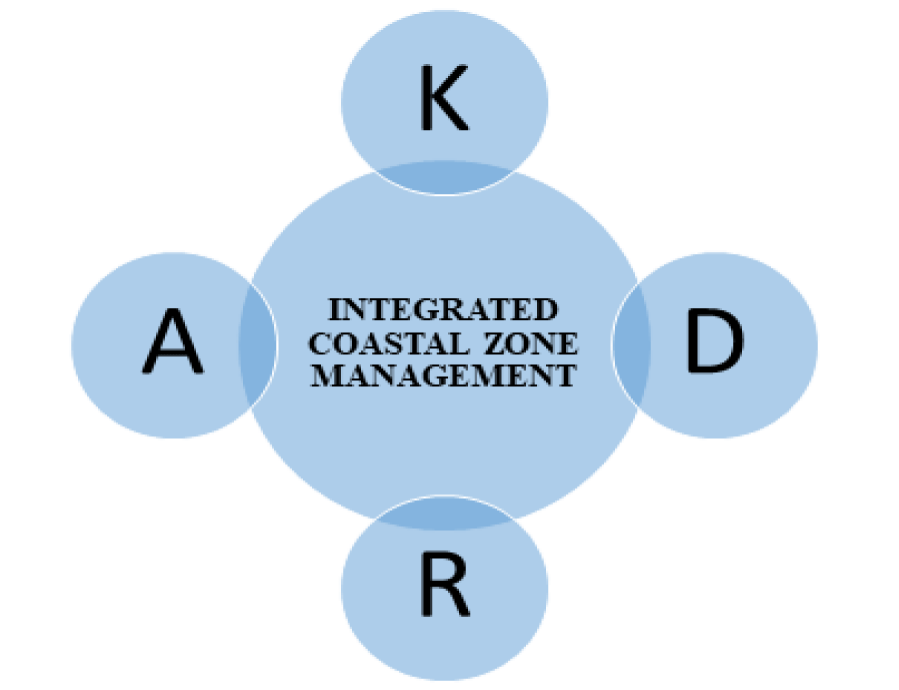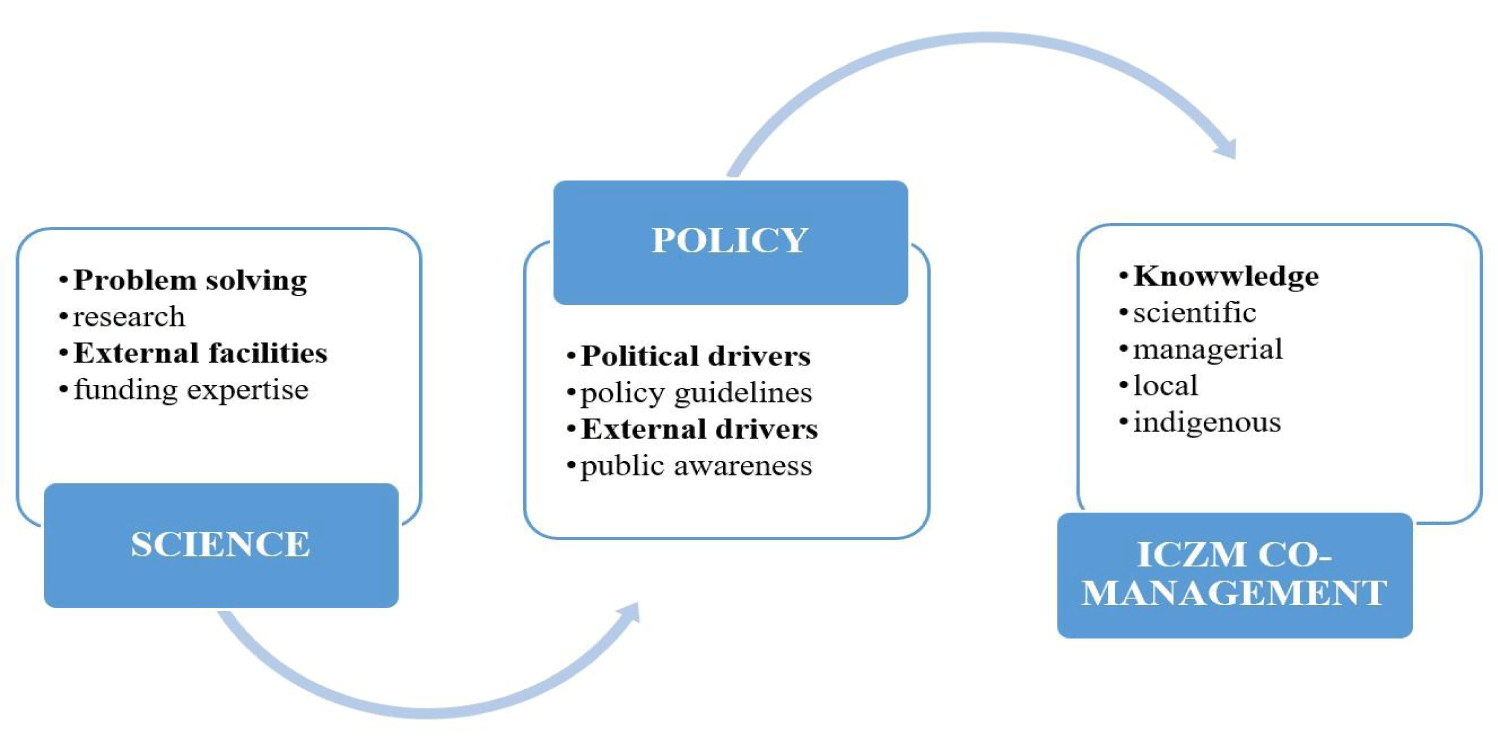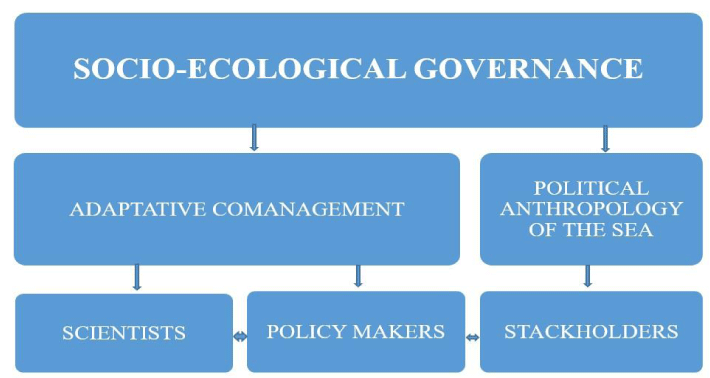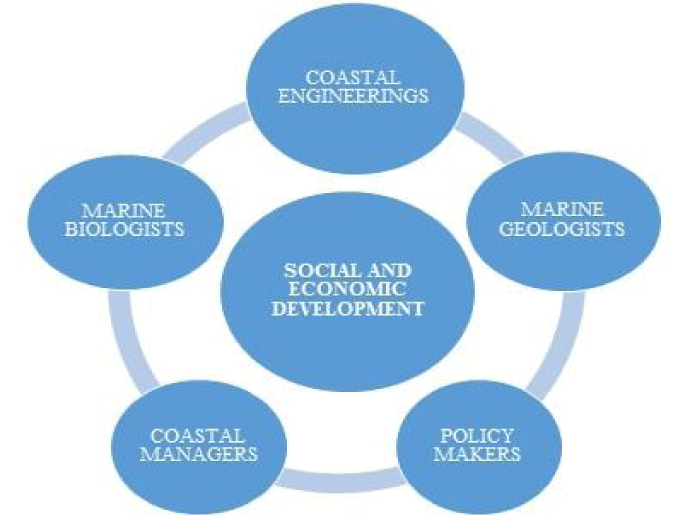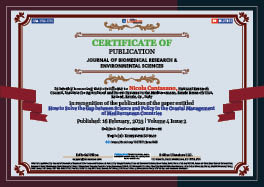Environmental Sciences . 2023 February 16;4(2):245-254. doi: 10.37871/jbres1668.
How to Solve the Gap between Science and Policy in the Coastal Management of Mediterranean Countries
Nicola Cantasano1* and Silvestro Greco2
2Zoological Station Anton Dohrn, Amendolara Station, Cs., Calabria, Italy
- ICZM
- Science
- Policy
- Mediterranean countries
- Knowledge
Abstract
The gap between Science and Policy is one of the main problems affecting the implementation of a sound coastal zone management in Mediterranean countries. Really, littoral and marine ecosystems supply a lot of environmental services, that are actually exposed to many natural and anthropic risks, influencing the ecological status of coastal areas. So, in the Mediterranean basin, it has been introduced on 2002 a participatory process named Integrated Coastal Zone Management (ICZM) to address scientific and political efforts towards a right marine policy. To highlight the lacking connection between the scientific approach to coastal management and the current inertia of policy actors, it has been presented a typical case study tested in a marine protected area located on the western seaside of the Calabria region (Southern Italy). The innovative framework proposed by this paper highlights the fundamental role of widespread public knowledge to bridge the gaps, still existing, between Science and Policy. By this way, it is suggested a new conceptual pattern able to connect the two cornerstones of ICZM program through mutual interactions mediated by knowledge processes. So, it is hoped for an adaptive co-management of coastal zones based on a close collaboration between scientists, policy makers, stakeholders and public opinion into a socio-ecological “governance” of coastal regions. Finally, it is necessary to involve all private and public subjects to develop a continuous dialogue for an effective ICZM implementation in Mediterranean countries.
Introduction
A steady flow of knowledge between Science and Policy is the main requirement for a sound management of environmental systems, as it is well known by scientific literature [1-3]. By this way, a marine policy based on objective data becomes more and more important in the public debate [4]. However, as matter of fact, the need to integrate Science and Policy in managerial processes, involving different institutions, various stakeholders, policy actors, and scientific community remains, until now, a real challenge [5]. Really, the trouble of an effective merging between Science and Policy is a concern, hindering the solution of many environmental issues [6]. In particular, coastal ecosystems supply a lot of environmental services such as food production, nutritional resources, climate regulation, recreational utilities and other important functions reaching important financial values world-wide, estimated on 1997 year as US $ 145 trillion per year, amongst one of the highest in terrestrial biosphere [7,8]. Also the Mediterranean coastal regions produce a high domestic income resulting from marine activities, such an annual economic value of about US $ 450 billion [9]. However, there are many coastal regions where some risk factors, affecting the ecological status of marine ecosystems [10], are fast increasing year by year [11]. Therefore, for a better sustainability of the coastal region, it is attended a gradual shift in its management from a kind of approach based on scientific data to a global vision based on an effective integration between local traditions and public presence according to a participatory process. In the Mediterranean basin, it has been introduced on 2002 a new pattern of coastal management, named Integrated Coastal Zone Management (hereafter ICZM) originating from the Mediterranean Action Plan (MAP), adopted by the United Nation Environment Program (UNEP) on 1975 for the control and the prevention against marine pollution [12]. From this agreement, signed by twenty-one Mediterranean countries [13] (www.unepmap.org), it has been developed the ICZM process, that represents the best way to address the political making progress towards a sound coastal management [14]. Really, in all Mediterranean countries, ICZM has been widely recognized as a proactive process aimed to address all the conflicts and interests of individual state members towards the same coastal space [15]. The legislative point of reference in the European Union is recommendation 2002/43/EC, which suggests to all member states process national plans for a general overview of coastal areas according to ICZM principles. In these last years, some Mediterranean countries have realized scientific and political efforts to address all the different kinds of knowledge in policy options [16-18]. In this way, the supporters of the ICZM process have suggested a new political scenery where coastal communities could be able to reach public interests supported by the indigenous knowledge of local issues [19]. This ideal outcome can be realized through an effective integration between natural and social sciences into a decision-making process at the interface between Science and Policy [20,21]. To highlight the lacking connection that still exists between scientists and decision-makers it is proposed a typical case study in the Calabria region (Southern Italy). This paper aims to develop a conceptual framework able to connect tight relationships between Science and Policy, filling the gaps still existing and building the required links to bring scientific knowledge into an effective decision-making process.
Methods
This study was based on a systematic review of publications addressing the gap between Science and Policy in coastal management. The bibliographic search was carried out according to the Preferred Reporting Items for Systematic Reviews and Meta-Analyses (PRISMA) statement [22]. To realize such purpose and to obtain a global overview of international studies holding information about this topic, Scopus was searched for articles until 31 December 2019, including the terms: ICZM, Science, Policy, Coastal Management and Mediterranean countries, in their title, abstract and keywords. After detecting duplicates and unavailability, a total of 57 papers were found useful to provide definitions and concepts about the roles of Science and Policy in the coastal management of Mediterranean countries.
The state of ICZM process in Mediterranean coastal regions
In Mediterranean countries, the first step towards an integrated management of coastal zones was the ICZM Protocol [23,24]. This law is, actually, the more suitable tool for a sustainable development of Mediterranean regions, as suggested by European marine policy [13,25-29]. Such large community policy suggests all member states to adopt national plans of ICZM, but the resulting outcomes have been very unlike in all Mediterranean countries [30]. Really, in spite of these legislative efforts, ICZM process proceed very slowly and appears unsuited to reply against the increasing and fast decay of coastal areas [31]. So, it is necessary to update the present state of ICZM planning in Mediterranean countries. In these last years it has been recorded some progress in the implementation of the process in the coastal regions of the basin. However, it has been remarked that most of the efforts are represented by regional and/or local initiatives while national programs are in a clear minority [32]. By this way, the resulting data, updated on 2020 year, show that only ten countries amongst twenty-one, adopted home plans while in sixteen are actually in progress regional projects (Table 1).
| Table 1: Pattern of scientific efforts, legislative means and public knowledge in the ICZM implementation updated on 2020 year. | ||||||
| Mediterranean Countries | Public Knowledge | Regional Projects | National Projects | Regional Laws | National Laws | Levels ICZM Implementation |
| Spain | Yes | Yes | Yes | Yes | Yes | E |
| France | Yes | Yes | No | No | Yes | M |
| Monaco | No | Yes | No | No | No | P |
| Italy | No | Yes | No | Yes | No | P |
| Slovenia | Yes | Yes | No | Yes | Yes | M |
| Croatia | No | Yes | No | Yes | No | P |
| Bosnia & Herzegovina | No | Yes | No | No | No | B |
| Montenegro | No | Yes | Yes | No | Yes | M |
| Albania | No | No | Yes | Yes | Yes | M |
| Greece | No | Yes | No | No | Yes | P |
| Malta | No | No | Yes | Yes | Yes | M |
| Turkey | Yes | Yes | No | Yes | Yes | G |
| Cyprus | Yes | Yes | No | No | No | P |
| Syria | Yes | Yes | Yes | No | Yes | G |
| Lebanon | No | Yes | Yes | No | Yes | M |
| Israel | No | No | Yes | No | Yes | P |
| Egypt | No | Yes | No | No | No | B |
| Libya | No | No | Yes | No | No | B |
| Tunisia | No | Yes | Yes | No | Yes | M |
| Algeria | Yes | No | Yes | No | Yes | M |
| Morocco | No | Yes | No | No | No | B |
| E: Excellent Level; G: Good Level; M: Mediocre Level; P: Poor Level; B: Bad Level | ||||||
The effects of this kind of coastal management are subjected to the tyranny of “small decisions” [33] rather than a comprehensive and long-term vision typical of ICZM process. The results of the survey highlight that the levels of ICZM implementation in Mediterranean countries are quite short with just one nation at excellent level as the 5% of the whole, two at a good level as 9%, eight at a mediocre level as 38%, six at a poor level as 28% and four at a bad one as (19%) (Figure 1).
In particular, it is reported the level of ICZM implementation, according to a decreasing scale from the score of five, as an excellent degree to the score of one, as a bad one, all distinguished in each of the twenty-one Mediterranean countries (Figure 2). The levels are defined according to the presence or the absence, in each Mediterranean countries, of five criteria as public knowledge, regional projects, national projects, national laws and regional laws, showed in table 1.
In this critical condition, the central core of ICZM process must become the key-word “integration” that, according to [34], is composed by the following meanings [35]:
- Objective integration between the main targets of coastal management, based on a sustainability approach.
- Horizontal integration between the different sectors of coastal activities, such as fishing, tourism, maritime transport, etc…
- Vertical integration between the different levels of coastal “governance”, as are local, regional and national plans.
- Cross integration between different areas of expertise in coastal management from scientific, to managerial, to policy arena.
- Spatial integration through land and sea connected in the same coastal landscape unit.
- Temporal integration between short-term and long-term actions.
In this context, the public participation represents the cornerstone of ICZM process, as highlighted also in the Article 4 of its protocol. By this way, the fundamental role of all the leading parts involved in the process such as scientific community, private sectors, stakeholders, policy makers and public opinion must be identified and carefully valued according to a managerial approach proceeding in a bottom-up direction [36]. Finally, ICZM must be seen not as a project but rather as a process able to involve local learnings into a knowledge course [3-40].
The Spanish experience
The precise characterization of coastal regions in terms of socioeconomic and environmental variables contribute to prioritizing the differential integrated management measures in each Coastal Marine and Socio-Ecological Systems, known as CMSESs [41]. In this way, following the Blue Economy Report, launched by the European Union on 2020, Spain is the first Mediterranean country in Europe engaged to contribute to the EU blue economy for a real and effective people employment and just the second, after United Kingdom, in terms of Gross Added Value.
The gap between science and policy
The scientific community has been very engaged in researches and projects to support an effective ICZM process in Mediterranean countries but the debate is mainly based on theoretical and abstract papers instead of empirical and pragmatic approaches typical of the first trials conducted in the United States of America [42-44]. Really, the outcomes of this kind of search remain unimportant for coastal managers while still exists a marked difference between scientific progress, which is realized in long time and policy action that, instead, calls for short times. This clear temporal deviation amongst scientific and policy dynamics is a big trouble hindering the melting process between Science and Policy. Today ICZM is living in a shadow area where the research efforts, the planning process and the policy issues remain fragmented actions without any possible solutions. The factors interfering with an effective implementation of ICZM in Mediterranean countries are [32]:
- The complexity of responsibilities
- The lacking of national policies
- Blocks, gaps and obstacles in the flow of information
- The shortage of participatory processes in public knowledge.
An effective public communication becomes the fundamental tool to bridge the gaps between Science and Policy reaching a common language so to achieve the best results in environmental management [45]. So, it is presented a typical example of the gaps still existing between the Science available and the Policies employed in the coastal management of a Mediterranean coastal region located in the western seaside of the Calabria region (Southern Italy).
A case study: The marine regional park “Scogli Di Isca”
The marine regional park “Scogli di Isca” was established by Calabria Region with the regional law n. 12 dated on 21 April 2018. Really, this marine site was characterized by a long and debated history. In fact, since from 1991, the Harbor Office of Cetraro (Cs., Italy) granted the World Wildlife Fund (W.W.F.) of Italy for the protection and the management of this important seaboard area (Figure 3).
So, the blue oasis of W.W.F. Italy became in 1994 the first Marine Centre of Environmental Education (C.E.A.M.) in the Calabria region. In those roaring years, the coastal region became an important center of environmental training and a real hotspot for diving activities. At the same time, this seaboard area was interested by a large coastal tourism at bathing vocation with about two thousand tourists for year. Indeed, it was realized in 1999 a Life Project founded by European Union, named W.W.F. Life Nature 99, through which it was organized a laboratory of Marine Botany, supplied with videotapes, optic and stereomicroscopes. Based on the scientific progress deriving from the project and according to a popular agreement by local people, it was proposed on 21 November 2002, a government bill to the regional Council of Calabria, within the seventh legislature, aimed to establish the first Marine Protected Area (MPA), named “Scogli Di Isca” on the western seaside of Calabria region. However, the political class began to dispute about this issue and, after all, such collective enterprise was a complete failure. So, this case study confirmed a total lack of communication between Science and Policy in coastal management. Thus, it could be envisaged to set up a bridge between Science and Policy, involving stakeholders and policy actors towards an effective ICZM able to connect coastal and continental regions in a joint environmental system. By this way, the establishment of a Marine Protected Area could allow a better public enjoyment of marine resources and, at the same time, could play a pivotal role for the economic growth of local people and for the social development of the region. Generally speaking, the financial and social benefits deriving from the realization of MPAs in Mediterranean basin could enhance a closer relationship between Science and Policy in the coastal management of littoral regions.
The role of knowledge
Knowledge is the main factor for a sound environmental management of coastal zones. Several authors highlighted the existence of big gaps in the implementation of ICZM process because the great complexity of environmental issues need a multi-purpose approach able to connect different subjects and expertise [46,47]. So, it is suggested to adopt a new conceptual framework able to fill the political vacuum in coastal management. Such pattern could be realized through a common net of connections intertwined by the fine thread of knowledge (Figure 4).
In this way, an effective transfer of cognitive patterns into marine Policy requires the admission that there are several relationships but also big differences between Science and Policy, which must be recognized and mediated by knowledge processes. The pattern proposed (Figure 5) highlights the existence of closed interactions, in double meaning, between the two cornerstones of ICZM.
Really, these connections are affected by policy issues, financial means and, also, by the involvement of public opinion. The four elements of this model are the following ones: A = Authority, R = Responsibility, D = Divulgation and K = Knowledge. In this pattern, Authority and Responsibility belong to the sphere of Policy while Divulgation and Knowledge to the range of Science. The two main components of coastal management, as are Science and Policy, hold the same weight so that A/R = K/D and therefore K = A ˣ D/R. So, the proposed pattern suggests the way for connecting Science and Policy in mutual interactions mediated by knowledge processes. At present, only seven Mediterranean countries on twenty-one are really engaged in information means for the public opinion (Table 1). So, ICZM process is still unaware of the added value represented by local expertise. This kind of knowledge, melt into native learnings of coastal people, is an important intellectual resource essential for a large ICZM implementation in all Mediterranean countries.
A socio-ecological system
Recently, it has been suggested by scientific community the principle of an adaptive co-management of coastal zones [48,49]. This model has been developed to make an ideal pattern of socio-ecological “governance” [50,51], based on a close collaboration between scientists, policy makers and different stakeholders, all engaged in coastal management [52]. So, it could be possible to join anthropic values with operative actions towards a versatile and collective coastal management. By this way, the innovative concept of an adaptive co-management must be translated into a socio-ecological system made by the tight relationships between scientists, policy makers and stakeholders, all directed towards a new kind of global vision: the political anthropology of the sea (Figure 6).
An overall analysis of the connections between nature and society allows a dynamic balance through the main social and ecological factors for an effective implementation of policy issues according to a multi-purpose approach necessary to fully understand the complexity of socio-ecological systems [53,54]. However, despite the international legislative efforts, a real versatility is very difficult to put into practice. To overcome all these troubles, it appears the idea to develop a multi-purpose platform able to come forward an effective coastal management through the following means:
- Introduce tools and methods typical of social science into the scientific field of environmental and marine sciences.
- Support an effective dialogue between all the branches of knowledge such as legislative, economic, policy and natural sciences.
So, it is suggested a new co-management approach to strengthen the innovative idea of a political anthropology of the sea (Figure 6) to better deal with a systematic management of coastal regions through a deep cooperation between social and natural sciences.
Insight and solutions
Following these suggestions and according to the directions established by ICZM program, especially at the Article 14 of its Protocol, it is necessary to involve in this process private and public subjects, such as tourists, local people, governments and policy makers creating a continuous dialogue for a sound exploitation of marine resources. By this way, it could be envisaged a novel approach to coastal management where marine biologists, geologists, coastal engineering, managers and policy makers work altogether in a close relationship for the socio-economic development of local people living in seaboard areas (Figure 7).
Really, all the European laws highlight the fundamental role of each Mediterranean countries and suggest tight connections between local, regional and national levels. However, in spite of such good intentions and apart from some rare exceptions, these suggestions, aimed to an effective ICZM process along Mediterranean coastal regions have been never implemented. Hence, this global approach, through a real involvement of the public knowledge, is a possible way to bridge the gap between Science and Policy in the coastal management of Mediterranean regions. So, in the light of what it is said, the final solution to the problem could be a close relationship amongst scientific and political actors, all engaged for a sound and reliable government of European countries overlooking the basin.
Conclusion
In terrestrial biosphere, the Mediterranean Sea is one of main hotspots for biodiversity conservation. Really, it holds just the 0.8% of surface waters but, nevertheless, it protects the 16.2% of marine biota being one of the most important areas for its high habitat diversity but also for the presence of many endemic species [55]. However, in these last decades the basin is exposed to growing environmental risks and human pressures affecting the levels of marine biodiversity [56] with serious and negative effects for ecosystem services in coastal areas [16]. Actually, scientists could play a pivotal role to join policy makers, coastal managers and various stakeholders towards an effective and ongoing collaboration in a new kind of coastal management [57,58]. By this way, marine protected areas could be the cornerstones to build up a connecting bridge between policy actors and scientific advisors. Today, it is time to fill the vacuum between scientific suggestions and political trends through the common interests of local people towards a sound planning of coastal regions. The final results, highlighted by this paper, show that, until now, still exists a poor public knowledge of ICZM principles in most of the Mediterranean countries. So, to overcome these problems, some guidelines are suggested:
- Information, education and public knowledge about littoral environments.
- Analysis and recognition of local needs through specific studies.
- Search for possible solutions aimed at addressing conflicts and interests for coastal resources.
In conclusion, this study highlights the need of an effective ICZM process, able to merge Science and Policy for the coastal management of Mediterranean countries.
Acknowledgments
Author contributions
Conceptualization, N.C. and S.G.; methodology, N.C.; validation, N.C. and S.G.; investigation, N.C.; data curation, N.C. and S.G.; writing-review and editing, N.C.; supervision, N.C. All authors have read and agreed to the published version of the manuscript.
Funding
This research received no external funding.
This research received no external funding.
Institutional review board statement
Not applicable.
Informed consent statement
Not applicable.
Data availability statement
Not Applicable.
Conflict of interest
The authors report there are not competing interest to declare.
References
- Likens GE. The role of Science in decision making: Does evidence-based science drive environmental policy? Front Ecol Environ. 2010;8(6):e1-e9. doi: 10.1890/090132.
- Parry S, Murphy J. Towards a framework for analyzing interactions between social science and environmental policy. Evidence and Policy. 2013;9(4):531-546. doi: 10.1332/174426413X13836455133196.
- Dale P, Sporne I, Knight J, Sheaves M, Eslami-Andergoli L, Dwyer PA. Conceptual model to improve links between science, policy and practice in costal management. Marine Policy. 2019;103:42-49. doi: 10.1016/j.marpol.2019.02.029.
- Orach K, Schlüter M. Uncovering the political dimension of social-ecological systems: contributions from policy process frameworks. Glob. Environ. Chang. 2016;40:3-25. doi: 10.1016/j.gloenvcha.2016.06.002.
- Bednarek AT, Wyborn C, Cvitanovic C, Meyer R, Colvin RM, Addison PFE, Close SL, Curran K, Farooque M, Goldman E, Hart D, Mannix H, McGreavy B, Parris A, Posner S, Robinson C, Ryan M, Leith P. Boundary spanning at the science-policy interface: the practitioners' perspectives. Sustain Sci. 2018;13(4):1175-1183. doi: 10.1007/s11625-018-0550-9. Epub 2018 Mar 27. PMID: 30147800; PMCID: PMC6086300.
- Weichselgartner J, Kasperson R. Barriers in the science·policy·practice interface: toward a knowledge·action·system in global environmental change research. Global Environmental Change, Human and Policy Dimensions. 2010;20(2):266-277. doi: 10.1016/j.gloenvcha.2009.11.006.
- Costanza R, d’Arge R, de Groot R, Farber S, Grasso M, Hannon B, Limburg K, Naeem S, O’Neill S, Paruelo J, Raskin RG, Sutton P, van den Belt M. The value of the world’s capital services and natural capital. Nature. 1997;387:253-260.
- Mehvar S, Filatova T, Dastgheib A, de Ruyter van Steveninck E, Ranasinghe R. Quantifying economic value for coastal ecosystem services: A review. J Mar Sci Eng. 2018;6(1):5. doi: 10.3390/jmse6010005.
- Randone M, Di Carlo G, Costantini M. Reviving the economy of the Mediterranean Sea. Action for a sustainable future. W.W.F. Mediterranean Marine Initiative, Rome, Italy. 2017;64.
- Jackson JBC, Kirby MX, Berger WH, Bjorndal KA, Botsford LW, Bourque BJ, Bradbury RH, Cooke R, Erlandson J, Estes JA, Hughes TP, Kidwell S, Lange CB, Lenihan HS, Pandolfi JM, Peterson CH, Steneck RS, Tegner MJ, Warner RR. Historical overfishing and the recent collapse of coastal ecosystems. Science. 2001;293:629-637. doi: 10.1126/science.105919.
- Barbier EB, Hacker SD, Kennedy C, Koch EW, Stier AC, Silliman BR. The value of estuarine and coastal ecosystem services. Ecol Monogr. 2011;81(2):169-193. doi: 10.1890/10-1510.1.
- Jeftic L. The role of science in marine environmental protection of regional seas and their coastal areas. The experience of the Mediterranean action plan. Marine Pollution Bulletin. 1992;25(1-4):66-69. doi: 10.1016/0025-326X(92)90188-C.
- United Nation Environment Program (UNEP) 2008. Protocol on Integrated Coastal Management in the Mediterranean. Priority Actions Program, Split. 2020. p. 89.
- Cooffey B, O’Toole K. Towards an improved understanding of knowledge dynamics in integrated coastal zone management: A knowledge system framework. Conservation & Society.2012;10(4):318-329.
- European Environmental Agency (EEA). The changing face of Europe’s Coastal Areas. Report no.6. 2006. p. 112.
- Cantasano N, Pellicone G, Ietto F. Integrated coastal zone management in Italy: A gap between science and policy. Journal of Coastal Conservation. 2017;21:317-325.
- Karnauskaite D, Schernewski J, Schumacher J, Grumert R, Povilanskas R. Assessing coastal management case studies around Europe using an indicator based tool. J Coast Conserv. 2018;22(3):549-570.
- Whelchel AW, Reguero BG, van Wesenbeeck B, Renaud FG. Advancing disaster risk reduction through the integration of science, design, and policy into eco-engineering and several global resource management processes. Int J Disaster Risk Re. 2018;32:29-41. doi: 10.1016/j.ijdrr.2018.02.030.
- Bremer S, Glavovic B. Mobilizing knowledge for coastal management: Re-framing science-policy interface for integrated coastal management. Coastal Management. 2013;41:39-56. doi: 10.1080/08920753.2012.749751.
- Mazé C, Dahou T, Ragueneau O, Danto A, Mariat-Roy E, Raimonet M, Weisbein J. Knowledge and power in integrated coastal management. For a political anthropology of the sea combined with the sciences of the marine environment. Comptes Rendus Geoscience. 2017;349:359-368. doi: 10.1016/j.crte.2017.09.008.
- Mazé C, Ragueneau O. Governance of the océan: where science meets politics/La governance de l’océan, un chantier entre science et politique. In: L’Océan á decouvert. Euzen A, Galiil F, Lacroix D, Cury P, editors. CNRS Ed. 2017. p. 254-255.
- Moher D, Liberati A, Tetzlaff J, Altman DG; PRISMA Group. Preferred reporting items for systematic reviews and meta-analyses: the PRISMA statement. PLoS Med. 2009 Jul 21;6(7):e1000097. doi: 10.1371/journal.pmed.1000097. Epub 2009 Jul 21. PMID: 19621072; PMCID: PMC2707599.
- European Union (EU). Protocol on Integrated Coastal Zone Management in the Mediterranean. Official Journal of European Union. Luxemburg. 2009;19-28.
- United Nation Environment Program (UNEP). Regional Oceans Governance. The 18th Global Meeting of the Regional Seas, Conventions and Action Plans. UNEP Regional Reports and Studies No. 197. Incheon, Korea. 2016. p. 40.
- International Union for Conservation of Nature (IUCN). International conference on marine parks and reserves: Recommendations. Special supplement to the IUCN Bull. 1975;6(7).
- Towards a European Integrated Coastal Zone Management (ICZM) strategy: general principles and policy options. Office for official publication of the European communities. European Commission (EC). Luxemburg; 1999. p. 35.
- Green Paper: Towards a future maritime policy for the union. A European vision for the ocean and seas. European Commission (EC). Bruxelles. 2006.
- Communication from the commission- report to European parliament and the council: an evaluation of Integrated Coastal Zone Management (ICZM) in Europe. COM 308. European Commission (EC). 2007. p. 10.
- Recommendation on integrated coastal zone management. European Commission (EC). Bruxelles. 2016.
- Evaluation of integrated coastal zone management in Europe. Final Report. Rupprecht Consult and International Ocean Institute. Cologne, Germany. 2006.
- McKenna J, Cooper A. Sacred cows in coastal management: the need for a “cheap and transitory” Model. Area. 2006;38(4):421-431.
- Shipman B, Stojanovic T. Facts, fictions, and failures of integrated coastal zone management in Europe. Coastal Management. 2007;35:375-398. doi: 10.1080/08920750601169659.
- Odum E. Environmental degradation and the tyranny of small decisions. Bioscience. 1982;32(9):728-729. doi: 10.2307/1308718.
- Cicin-Sain B, Knecht R, Vallega A, Harakunarak A. Education and training in integrated coastal management: lessons from the international arena. Ocean and Coastal Management. 2000;43:291-330. doi: 10.1016/S0964-5691(00)00030-2.
- Garriga M, Losada IJ. Education and training for integrated coastal zone management in Europe. Ocean & Coastal Management. 2010;53:89-98. doi: 10.1016/j.ocecoaman.2010.01.004.
- Barale V, Özhan E. Advances in integrated coastal management for the mediterranean & black sea. J Coast Conserv.2010;14:249-255. doi: 10.1007/s11852-010-0116-1.
- Changing times: Coastal management 1986 to 2000. Intercoast Network. International newsletter of coastal management. Coastal Resources Center. 2007;36-37.
- Tobey J, Lowry K. Special section on learning from the practice of integrated coastal management. Coastal Management. 2000;30(4):283-345.
- Olsen SB. Crafting coastal governance in a changing world. Coastal Management Report #2241. CRC/USAID, University of Rhode Island. 2003.
- Koutrakis E, Sapounidis A, Marzetti S, Marin V, Roussel S, Martino S, Fabiano M, Paoli C, Ray-Valette H, Povh D, Malvárez CG. ICZM and coastal defence perception by beach users: Lessons from the Mediterranean coastal area. Ocean & Coastal Management. 2011;54:821-830. doi: 10.1016/j.ocecoaman.2011.09.004.
- Lazzari N, Becerro MA, Sanabria-Fernandez JA, Martín-López B. Spatial characterization of coastal marine social-ecological systems: Insights for integrated management. Science & Policy. 2019;92:56-65. doi: 10.1016/j.envsci.2018.11.003.
- Vallega A. Conceptual approach to Integrated Coastal Management. Ocean & Coastal Management. 1993;21:149-162. doi: 10.1016/0964-5691(93)90024-S.
- Vallega A. Focus on integrated coastal management-comparing perspectives. Ocean & Coastal Management. 2001;44:119-134. doi: 10.1016/S0964-5691(00)00083-1.
- van der Maarel E, van der Meulen F. The Journal of Coastal Conservation, 1995-2004. Journal of Coastal Conservation. 2004;10(1):169-188. doi: 10.1652/1400-0350(2004)010[0169:TJOCC]2.0.CO;2.
- Stringer LC, Dougill AJ. Channelling science into policy: enabling best practices from research on land degradation and sustainable land management in dryland Africa. J Environ Manage. 2013 Jan 15;114:328-35. doi: 10.1016/j.jenvman.2012.10.025. Epub 2012 Nov 15. PMID: 23158525.
- Nesshöver C, Assmuthe T, Irvine KN, Rusch GM., Waylen KA, Delbaere B, Haase D, Walters LJ, Keune H, Kovacs E, Krauze K, Külvik M, Rey F, van Dijk J, Vistad OI, Wilkinson ME, Wittmer H. The science, policy and practice of nature-based solutions: An interdisciplinary perspective. Sci Total Environ. 2017;579:1215-1227. doi: 10.1016/j.scitotenv.2016.11.106.
- Snoeijs-Leijonmalma P, Barnardh S, Elliott M, Andrusaitisc A, Kononenc K, Sirolac M. Towards better integration of environmental science in society: lessons from BONUS, the joint Baltic Sea environmental research and development programme. Environ Sci Policy. 2017;78:193-209. doi: 10.1016/j.envsci.2017.10.004.
- Armitage D, Berkes F, Doubleday N. Adaptive co-management: collaboration, learning, and multi-level governance. Vancouver: University of British Columbia Press; 2007.
- Plummer R, Crona B, Armitage BR, Olsson P, Tengö M, Yudina O. Adaptive co-management: A systematic review and analysis. Ecol Soc.2012;17(3):11. doi: 10.5751/ES-04952-170311.
- Liu J, Dietz T, Carpenter SR, Alberti M, Folke C, Moran E, Pell AN, Deadman P, Kratz T, Lubchenco J, Ostrom E, Ouyang Z, Provencher W, Redman CL, Schneider SH, Taylor WW. Complexity of coupled human and natural systems. Science. 2007;317(5844):1513-1516. doi: 10.1126/science.114400.
- Collins SL, Carpenter SR, Swinton SM, Orenstein DE, Childers DL, Gragson TL, Grimm NB, Grove JM, Harlan SL, Kaye JP, Knapp AK, Kofinas GP, Magnuson JJ, McDowell WH, Melack JM, Ogden LA, Robertson GP, Smith MD, Whitmer AC. An integrated conceptual framework for long-term social-ecological research. Frontiers in Ecology and the Environment. 2010;9(6):351-357. doi: 10.1890/100068.
- Kofinas GP. Adaptive co-management in socio-ecological governance. In: Chapin FS, Kofinas GP, Folke C, editors. Principles of ecosystem stewardship, Resilience-based natural resource management in a changing world. Springer; 2009. p. 77-101.
- Holling CS. Understanding the complexity of economic, ecological and social systems. Ecosystems. 2001;4:390-405. doi: 10.1007/s10021-001-0101-5.
- Blanchard A, Van der Linden JP. Prerequisites to interdisciplinarity research for climate change: lessons from a partecipatory action research process in Ile-de-France. Int JSustainable Dev. 2012;16(1/2). doi: 10.1504/IJSD.2013.053788.
- Bianchi CN, Morri C. Marine biodiversity of the Mediterranean Sea: situation, problems and prospects for future research. Marine Pollution Bulletin. 2000;40:367-376. doi: 10.1016/S0025-326X(00)00027-8.
- Mouillot D, Albouy C, Guilhhaumon F, Ben Rais Lasram F, Coll M, Devictor V, Meynard CN, Pauly D, Tomasini JA, Troussellier M, Velez L, Watson R, Douzery JP, Mouquet N. Protected and threatened components of fish biodiversity in the Mediterranean Sea. Current Biology. 2011;21:1044-1050. doi: 10.1016/j.cub.2011.05.005.
- Olsen SB, Tobey J, Kerr M. A common framework for learning from ICM experience. Ocean & Coastal Management. 1997;37(2):155-174. doi: 10.1016/S0964-5691(97)90105-8.
- Smith HD. The role of the social sciences in capacity building in ocean and coastal management. Ocean & Coastal Management. 2002;45(9-10):573-582. doi: 10.1016/S0964-5691(02)00087-X.
Content Alerts
SignUp to our
Content alerts.
 This work is licensed under a Creative Commons Attribution 4.0 International License.
This work is licensed under a Creative Commons Attribution 4.0 International License.





